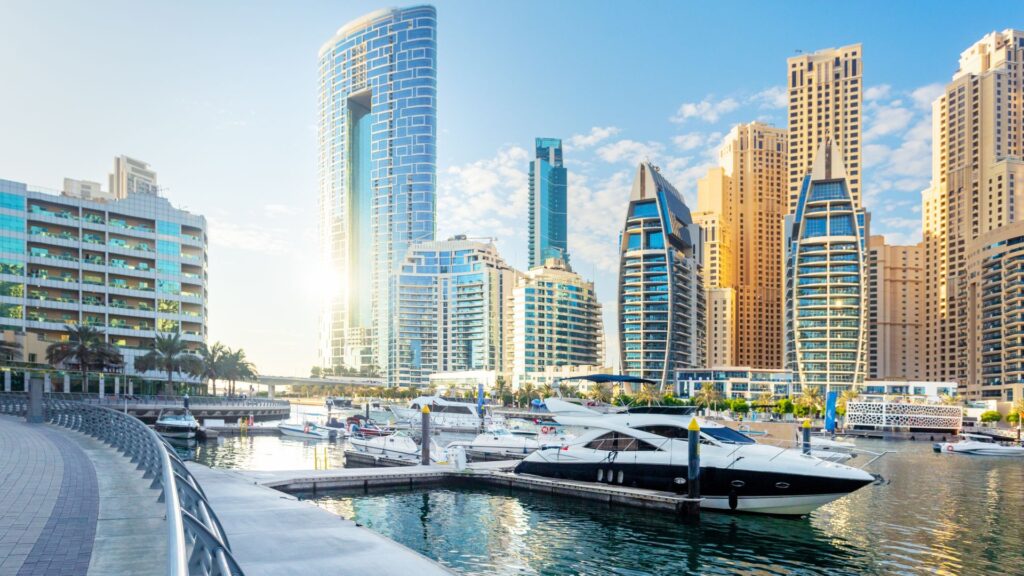The world of business is evolving rapidly, and companies across the globe are constantly seeking ways to optimize their operations, reduce tax burdens, and expand into lucrative markets. In recent years, Dubai has emerged as a top destination for entrepreneurs and businesses relocating from the UK, thanks to its strategic location, tax-friendly policies, and thriving free zones. If you are considering moving your UK-based business to a Dubai Free Zone in 2025, this comprehensive guide will walk you through every step of the process.
We will cover why Dubai is an ideal choice, the benefits of free zones, legal and regulatory considerations, and a detailed step-by-step relocation process. By the end, you will have a complete roadmap for setting up your company in Dubai while ensuring compliance and maximizing opportunities.
Why Move Your Business from the UK to Dubai in 2025?
The UK has long been a global business hub, but factors like increasing taxes, economic uncertainty, and regulatory complexities are prompting many companies to explore new horizons. Here are some key reasons why entrepreneurs are choosing Dubai:
1. Tax Advantages
One of the most significant benefits of moving your business to Dubai is the tax structure. The UAE has no personal income tax, and while corporate tax was introduced in 2023, free zone companies can still enjoy 0% tax on qualifying income, provided they meet compliance requirements.
2. Strategic Location
Dubai is positioned at the crossroads of Europe, Asia, and Africa, making it a perfect hub for global trade. Businesses operating in Dubai can easily access markets in the Middle East, Africa, and South Asia, all within a few hours’ flight.
3. Ease of Doing Business
The UAE ranks highly in ease of doing business, thanks to streamlined processes, robust infrastructure, and pro-business policies. Setting up a company in a Dubai Free Zone is efficient, with many processes now fully digital.
4. Thriving Business Ecosystem
Dubai offers a dynamic environment for various industries, including finance, technology, logistics, and e-commerce. The government actively supports innovation through initiatives like the Dubai Future Foundation and various incubator programs.
5. Quality of Life
From world-class healthcare and education to luxury living and cultural diversity, Dubai offers an excellent quality of life for business owners and employees alike.

Understanding Dubai Free Zones
Free zones are designated areas in Dubai that offer specific incentives to businesses, such as tax benefits, 100% foreign ownership, and simplified regulations. There are over 30 free zones in Dubai, each catering to different industries, including technology, media, logistics, and healthcare.
Key Benefits of Free Zones:
- Full foreign ownership with no requirement for a local sponsor.
- 0% personal income tax.
- Customs duty exemptions on imports and exports within the free zone.
- Simplified business setup procedures.
- Access to modern infrastructure and world-class facilities.
Choosing the Right Free Zone for Your Business
Selecting the right free zone depends on your business activity, target market, and budget. Here are some popular options:
- DMCC (Dubai Multi Commodities Centre): Ideal for trading and commodity businesses.
- IFZA (International Free Zone Authority): Cost-effective option for small businesses and startups.
- DIFC (Dubai International Financial Centre): Best suited for financial services and fintech companies.
- Dubai Internet City: Perfect for tech and IT businesses.
- Dubai Media City: Designed for media, marketing, and advertising companies.
Legal and Regulatory Considerations
Before relocating your business, it is important to understand the legal and regulatory framework in Dubai:
- Corporate Structure: Most businesses in free zones operate as Free Zone Companies (FZC) or Free Zone Establishments (FZE).
- Ownership: Foreign investors can own 100% of their business in a free zone.
- Visa Requirements: Free zone companies can apply for residency visas for owners and employees.
- Tax Compliance: While free zones offer tax benefits, companies must adhere to Economic Substance Regulations (ESR) and submit annual audits in some zones.

Step-by-Step Guide to Moving Your Business from the UK to Dubai Free Zone
Relocating your business may sound complex, but breaking it down into manageable steps makes the process much easier.
Step 1: Evaluate Your Business and Create a Relocation Plan
Start by assessing whether your existing business structure, operations, and model are compatible with Dubai regulations. Decide whether you will:
- Set up a new entity in Dubai and keep your UK company active.
- Close the UK entity and fully relocate to Dubai.
- Operate both entities under a holding structure.
This is also the stage to estimate costs, including licensing fees, visas, office space, and relocation expenses.
Step 2: Select the Right Free Zone
Based on your business activity, choose a free zone that aligns with your needs. Consider:
- Licensing cost.
- Office requirements.
- Visa quotas.
- Industry-specific facilities (e.g., studios, warehouses).
Step 3: Prepare Documentation
The general documentation includes:
- Passport copies of shareholders and directors.
- Proof of address.
- Business plan (for certain activities).
- Memorandum of Association (MoA).
- Existing company documents (if relocating an established business).
Step 4: Apply for Initial Approval
Once the documents are ready, submit your application to the chosen free zone authority for initial approval. This involves:
- Choosing your trade name.
- Specifying your business activity.
- Paying the initial fee.
Step 5: Secure Office Space
Free zones usually require businesses to lease physical office space. Options include:
- Flexi desks (shared workstations).
- Dedicated offices.
- Warehouses or custom-built facilities (for industrial businesses).
Step 6: Obtain Your License
After meeting all requirements and paying fees, the free zone authority will issue your trade license. This typically takes 1 to 3 weeks, depending on the free zone.
Step 7: Open a Bank Account
To operate your business, you will need a corporate bank account in the UAE. Prepare:
- Trade license.
- Shareholder documents.
- Company incorporation papers.
- Business plan and financial projections.
Note: Banks conduct due diligence, so expect KYC checks and compliance requirements.
Step 8: Apply for Visas
Free zone companies can sponsor visas for owners and employees. The number of visas depends on your office size and free zone rules.
Step 9: Transfer Assets and Operations
Once your business is licensed and operational in Dubai, you can start transferring assets, client contracts, and operations from the UK. Inform clients and suppliers about your new entity and ensure tax compliance in both jurisdictions during the transition.

Practical Tips for a Smooth Transition
- Work with Experts: Partner with business setup consultants who understand Dubai’s regulations.
- Budget Carefully: Include hidden costs like visa processing, health insurance, and bank account charges.
- Stay Compliant: Keep track of audit requirements, ESR, and ultimate beneficial ownership (UBO) filings.
- Leverage Networking: Attend Dubai business events to build connections and establish your brand in the local market.
Cost of Relocating to a Dubai Free Zone in 2025
The cost varies depending on the free zone, office size, and number of visas, but here is a rough estimate:
- License and registration: AED 12,000 to AED 20,000.
- Office space: AED 8,000 to AED 15,000 annually.
- Visa per person: AED 3,500 to AED 6,000.
- Bank account setup: May require a minimum balance of AED 50,000 to AED 150,000, depending on the bank.
The Future of Doing Business in Dubai
Dubai continues to attract global businesses thanks to its investor-friendly policies, advanced infrastructure, and strategic location. The city is moving toward becoming a global hub for technology, sustainability, and innovation. For UK businesses looking to expand or relocate, Dubai offers unmatched opportunities to thrive in a tax-efficient and progressive environment.

Final Thoughts
Relocating your business from the UK to a Dubai Free Zone in 2025 is a strategic move that can unlock tremendous benefits, including tax savings, global market access, and operational efficiency. While the process involves careful planning and compliance, the rewards make it worthwhile.
Looking for a Hassle-Free Setup?
If you want expert guidance to ensure your business relocation is smooth, cost-effective, and compliant, GenZone is here to help. With years of experience in company formation and a proven track record, GenZone offers transparent pricing, end-to-end support, and tailored solutions to make your transition to Dubai effortless. From choosing the right free zone to handling licenses, visas, and banking, GenZone does it all for you. Your new business life in Dubai starts here.

